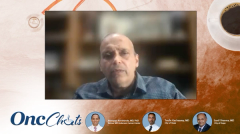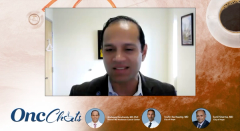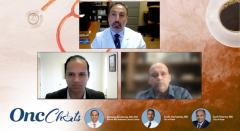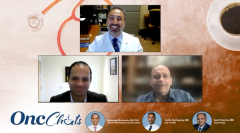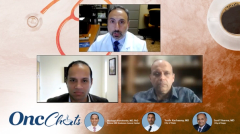
Leveraging Immunotherapy in GI Malignancies: Assays for Early Detection and Prevention
In this episode of OncChats: Leveraging Immunotherapy in GI Malignancies, experts explain the challenges faced with preventing or detecting these cancers early and the understanding needed to develop effective early detection methods and move the needle forward.
Episodes in this series

In this second episode of OncChats: Leveraging Immunotherapy in GI Malignancies, Toufic Kachaamy, MD, of City of Hope, Sunil Sharma, MD, of City of Hope, and Madappa Kundranda, MD, PhD, of Banner MD Anderson Cancer Center, explain the challenges faced with preventing or detecting these cancers early and the understanding needed to develop effective early detection methods and move the needle forward.
Kundranda: In the context of looking at these multiomic assays with diagnostic imaging or endoscopic evaluation, where do you think we would [get] the most bang for our buck? [For example,] we have had some advances that we’ve made in colorectal cancer in terms of the adjuvant setting with some of these liquid biopsies. Where do you see that to be a good spot where we have probably the most data and we might actually [get] the most bang for our buck?
Sharma: In terms of [getting] return on investment, maybe we can think about it as two main areas. One is the area of early detection, where you want to [get] bang for the buck in detecting colorectal [cancer] or any of these malignancies early. That’s one potential area that we could talk about. The other would be to [take those] who are already prone to cancer and use the assays to basically prevent cancers. [With that,] I’m separating them from a general population to a defined population.
For the general population, I think there’s a lot of effort going on in malignancies that are fairly common. When you’re approaching [this] population, you need to increase the sensitivity and specificity, but you also need to have a relatively common tumor in order to develop these assays so then you can test them. There are many approaches that are being used for that area. Companies like Grail, for instance, have [put] a lot of resources [into] developing liquid biopsy, if you want to call it that—they’re mostly methylation of DNA in the blood. They have [put] a lot of resources [into] actually differentiating cancer from “normals.” They have spent a lot of time and energy over the years in collecting thousands of samples from “normal” people, and also from those who had different kinds of cancers like colon cancer. [As such,] their assays are getting better in that area of just taking a person off the street and just doing an assay.
Once that particular assay technology becomes even better, then we have the chance of actually detecting something like colon cancer, and we all know that if we could detect it early, we could cure most of those patients. [We also] know that the current gold standard for detection is colonoscopy and that has been very good, but the uptake of colonoscopy is low. In Arizona, I think the latest data [indicate that approximately] 52% of eligible people get colonoscopies. We also have another problem with colonoscopy, which is that we have an epidemic of young people getting colon cancer, which is unexplained. That epidemic really makes it harder to deploy colonoscopies. Because these people now are getting metastatic colon cancer essentially at very early ages. My clinic, and I’m sure your clinic, is full of people who are between 25 and 40 [years] who [have] metastatic disease and this is an epidemic that the National Institutes of Health has deployed consensus panels. Right now, the consensus is that it’s not a genetic phenomenon; it’s an epigenetic phenomenon. There’s something in the environment or something else that’s causing this epidemic. So, because of all these situations, we really need a sensitive and specific test that can be deployed in a relatively affordable way in that realm.
Now, when it comes to potentially detecting cancers, how do we go about taking the approach in more defined populations? In gastrointestinal [GI] malignancies, I’m sure that the gastroenterologists have difficulty figuring out pancreas cancer, [for example.] Pancreas cancer is uniformly lethal whenever it’s detected with symptoms. So, is there a possibility of narrowing down this large population to people who have some risk factors? [For example,] one could argue [that] people who are smokers or who are diabetics [have] a higher incidence. [Then there are] people who have family histories—obviously, that’s a small number, but that would be an opportunity to deploy a certain kind of test in that population. [These are good examples of where] we [can] narrow things down from a very large population to a smaller population, and then try to develop the test and [evaluate] its sensitivity and specificity.
I don’t know if I answered the question totally, but this is a complex issue. We are making lots of advances, and really, the gamechanger for GI malignancies is going to be detecting these cancers earlier.


